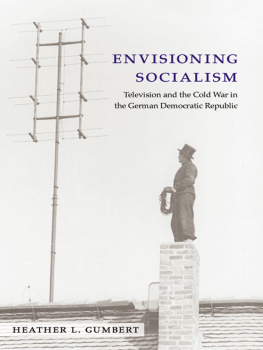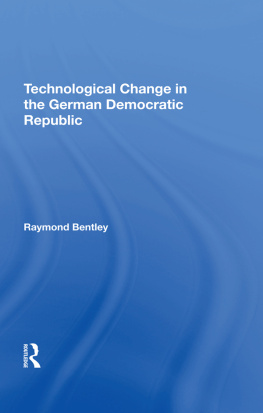Guide

Page i Page ii
Social History, Popular Culture, and Politics in Germany
Geoff Eley, Series Editor
Series Editorial Board
Kathleen Canning, University of Michigan
David F. Crew, University of Texas, Austin
Atina Grossmann, The Cooper Union
Alf Ldtke, University of Erfurt, Germany / Hanyang University, Seoul, Korea
Andrei S. Markovits, University of Michigan
Recent Titles
Envisioning Socialism: Television and the Cold War in the German Democratic Republic Heather L. Gumbert
The People's Own Landscape: Nature, Tourism, and Dictatorship in East Germany Scott Moranda
German Colonialism Revisited: African, Asian, and Oceanic Experiences Nina Berman, Klaus Mhlhahn, and Patrice Nganang, Editors
Becoming a Nazi Town: Culture and Politics in Gttingen between the World Wars David Imhoof
Germany's Wild East: Constructing Poland as Colonial Space Kristin Kopp
Colonialism, Antisemitism, and Germans of Jewish Descent in Imperial Germany, Christian S. Davis
Africa in Translation: A History of Colonial Linguistics in Germany and Beyond, 18141945, Sara Pugach
Between National Socialism and Soviet Communism: Displaced Persons in Postwar Germany, Anna Holian
Dueling Students: Conflict, Masculinity, and Politics in German Universities, 18901914, Lisa Fetheringill Zwicker
The Golem Returns: From German Romantic Literature to Global Jewish Culture, 18082008, Cathy S. Gelbin
German Literature on the Middle East: Discourses and Practices, 10001989, Nina Berman
Franz Radziwill and the Contradictions of German Art History, 191945, James A. van Dyke
Weimar through the Lens of Gender: Prostitution Reform, Woman's Emancipation, and German Democracy, Julia Roos
Murder Scenes: Normality, Deviance, and Criminal Violence in Weimar Berlin, Sace Elder
Changing Places: Society, Culture, and Territory in the Saxon-Bohemian Borderlands, 1870 to 1946, Caitlin E. Murdock
After the Nazi Racial State: Difference and Democracy in Germany and Europe, Rita Chin, Heide Fehrenbach, Geoff Eley, and Atina Grossmann
Work, Race, and the Emergence of Radical Right Corporatism in Imperial Germany, Dennis Sweeney
The German Patient: Crisis and Recovery in Postwar Culture, Jennifer M. Kapczynski
For a complete list of titles, please see www.press.umich.edu
Page iii
Envisioning Socialism
Television and the Cold War in the German Democratic Republic
HEATHER L. GUMBERT
THE UNIVERSITY OF MICHIGAN PRESS
Ann Arbor
Page iv
Copyright by Heather L. Gumbert 2014
All rights reserved
This book may not be reproduced, in whole or in part, including illustrations, in any form (beyond that copying permitted by Sections 107 and 108 of the U.S. Copyright Law and except by reviewers for the public press), without written permission from the publisher.
Published in the United States of America by
The University of Michigan Press
Manufactured in the United States of America
 Printed on acid-free paper
Printed on acid-free paper
2017 2016 2015 2014 4 3 2 1
A CIP catalog record for this book is available from the British Library.
ISBN 9780-472119196 (cloth : alk. paper)
ISBN 9780-472120024 (e-book)
Page v
For my parents
Page vi Page vii
Contents
Page viii Page ix
Acknowledgments
This work is the product of more years than I would like to admit. That it has finally seen the light of day, so to speak, is due to the support of a number of institutions and individuals.
I began this project as a doctoral student at the University of Texas at Austin, where I received financial, collegial, and moral support. Generous gifts to the Department of History from Eugene and Dora Bonham, John Paul Jones, Alice J. D. Sheffield, and Gardner F. Marston funded early research. The Berlin Program for Advanced German and European Studies at the Freie Universitt Berlin and the Social Science Research Council supported my dissertation research, offered me a supportive and challenging institutional home while I was in Berlin, and introduced me to some of my closest friends and colleagues. The Zentrum fr zeithistorische Forschung in Potsdam was a fount of generous and collegial scholars. Special thanks go to Christoph Klessmann and Thomas Lindenberger. Thanks to the members of my dissertation committee, David Crew, Peter Jelavich, Joan Neuberger, Tracie Matysik, and Sabine Hake; each one is a model scholar I can only hope to emulate.
Virginia Tech has been my institutional home for almost a decade, through thick and thin. The Department of History and the College of Liberal Arts and Human Sciences have provided support invaluable research support through a number of travel and research grants and stipends. The Jerome Niles Faculty Research Fellowship supported the final writing of the manuscript. Thanks also to my friends and colleagues at Virginia Tech, with whom I have shared and surmounted far more than any of us could have imagined.
I must acknowledge the support given by research professionals on two continents, without whom this work would not have been possible. I am indebted to the friendly and dedicated staff of Inter-library Loan at Virginia Tech. The staffs of the German Federal Archives in Lichterfelde and Dahlwitz-Hoppegarten, Page x the German Broadcasting Archives in Berlin-Babelsberg and Frankfurt, and the State Library of Berlin are credits to their profession. Dr. Ina Iske-Schwaen curates the archives of her late husband, Kurt Schwaen, and I especially thank her for her generosity (and hospitality) in sharing his life's work.
Thanks are also due to my family. Jane and J. Pat Stephens have cheerfully encouraged me throughout the project. Thanks to my parents, John and Penny Gumbert, for their patience and support through what sometimes seemed an interminable task. I dedicate this book to them. My Doktorvater David Crew has offered unflagging encouragement that sustained me through the writing of the manuscript. I value tremendously his scholarship, his friendship, and his admonition to finally finish it! Finally, I thank my husband Robert Stephens for his encouragement, partnership, and confidence in me.
Page xi
Abbreviations
| ARD | Arbeitsgemeinschaft der ffentlich-rechtlichen Rundfunkanstalten der Bundesrepublik Deutschland |
| BPO | Betriebsparteiorganisation |
| DDM | East German Mark (currency) |
| DEFA | Deutsche Film-Aktiengesellschaft |
| DFF | Deutscher Fernsehfunk |
| DFG | Deutsche Forschungsgemeinschaft |
| DIAS | Drahtfunk im amerikanischen Sektor |
| DM | West German Mark (currency) |
| DRA | Deutsches Rundfunkarchiv |
| FCC | Federal Communications Commission |
| FDGB | Freier Deutscher Gewerkschaftsbund |
| FDJ | Freie Deutsche Jugend |
| FRG | Federal Republic of Germany |
| GDR | German Democratic Republic |
| HICOG | United States High Commissioner in Germany |
| ITV | Independent Television |
| MDR | Mitteldeutscher Rundfunk |
| MPF-BRF | Ministerium fr Post- und FernmeldewesenBereich Rundfunk under Fernsehen |










 Page i Page ii
Page i Page ii  Printed on acid-free paper
Printed on acid-free paper